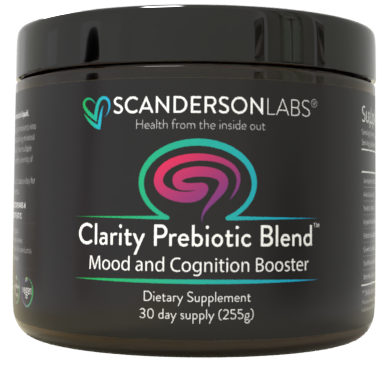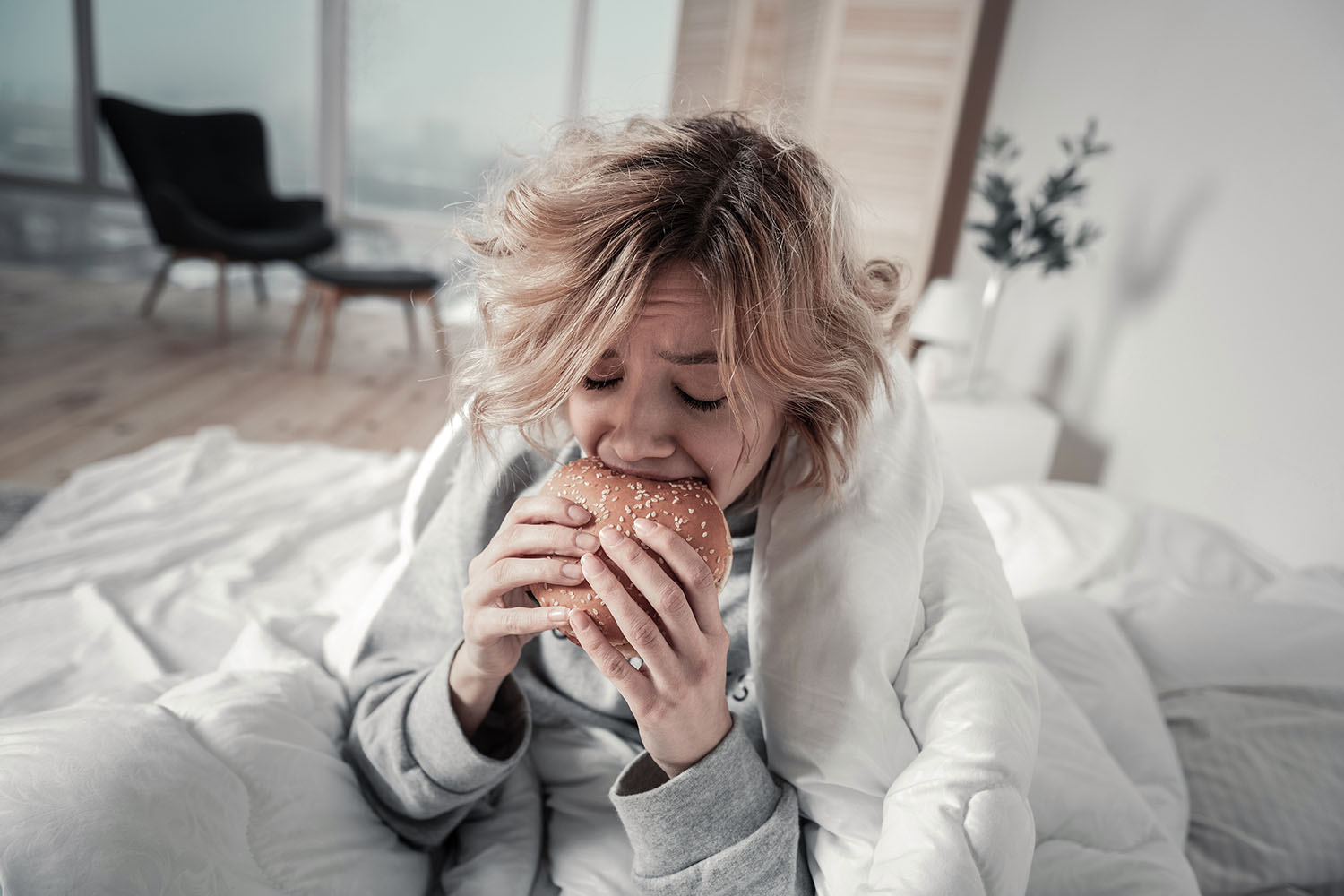Is Your Diet Making You Depressed?
“One should eat to live, not live to eat.”
—Moliere
Feeling gloomy? Look to your diet. When you eat, you feed yourself—but you also feed your gut microbes. There are trillions of them in your gut and they make up a thriving community called the microbiota. Like you, they have their own favorite foods. Amazingly, they may be able to communicate their desires to you, giving you cravings. Yes, your palate can be hijacked by your gut microbes!
Depending on what kind of microbes they are, those cravings can be good or bad for you. Some species of streptococcus in your small intestines just love sugar, and when you feed them, they produce dopamine to make you feel happy. This is a stunning amount of power to be wielded by a microbe! But these brain-tweaking bacteria may also be damaging your gut lining. To counter this, you need fiber-eating microbes. These beneficial bacteria manage to convert humble veggies into substances like fatty acids that act as both a nutrient and a balm to your gut lining. Give them time to flourish, and they can also make you happy.
There’s a good reason the acronym for the Standard American Diet is SAD.
Food can be divided into two broad categories: healthy and inflammatory. You likely know which is which already. Those foods manufactured to be irresistibly delicious—I’m looking at you, Ronald, Dunkin, Wendy, Reese, and the Cheetah dude—are not always on the healthy list. These should probably be treats, not staples, but in the modern world, it is hard to avoid making every meal a fat-infused flavor fest. Preferably with added sugar.
Lemon juice on broccoli? Not so much.
There is a ranking of these low-nutrient gut bombs called the Dietary Inflammatory Index (DII). Studies show that high-DII foods are linked with depression and other mental disorders. A meta-analysis from China reveals just how dangerous these foods can be. The researchers found an overall 25 percent increase in depression and an 85 percent increase in distress for those eating a high-DII diet. Alarmingly, they found a four-fold increase in schizophrenia on a high-DII diet. They also found a dose-response curve: For each one-unit increase in the DII, there was a 6 percent rise in symptoms of depression.
How do inflammatory diets affect health?
Inflammatory diets increase levels of cytokines, molecules that the immune system uses to rally dozens of different types of immune cells. Over time, chronic inflammation can affect the brain by weakening the blood-brain barrier, allowing toxins or bacteria to pass through. That alerts the immune system, which may enter the brain to chase them down. However, the immune system is not fastidious and can cause a lot of collateral damage when it goes on the warpath.
Where are these bacteria coming from? By and large, they are escapees from the gut. In the gut, they may be ideal citizens. But if bacteria are eroding your gut lining, those innocent microbes can migrate into the bloodstream. No matter how beneficial microbes may be in the gut, they are nothing but bad news in the bloodstream. The heart dutifully pumps these interlopers to every organ in the body and then the immune system swats them down with its typical heavy hand.
The China study nicely complements a large study at King’s College London also showing that inflammation is a fellow traveler with depression.
The British researchers looked at 27,000 subjects with major depression and found that they had elevated levels of inflammatory proteins. They weeded out factors including genes, age, sex, BMI, smoking, early-life trauma, and socioeconomic status. The only significant association was between depression and inflammation.
What foods are inflammatory?
Here are the top five inflammatory foods:
- Sweets: candy, pie filling, ice cream
- Refined carbs: buns, pasta, baked potatoes
- Processed meat: hot dogs, sandwich meat, sausage
- Alcohol: beer, wine, spirits
- Hydrogenated trans fats: French fries, pie crust
In other words, a typical American cookout. Sigh.
These foods—along with most processed food, fast food, and junk food—all result in a rise in inflammatory markers. As delicious as they are, we might be wise to pace ourselves.
What foods are anti-inflammatory?
Here are the top five anti-inflammatory foods:
- High-fiber veggies: artichoke, asparagus, broccoli
- Greens: spinach, kale
- Fish: salmon, sardine, cod
- Berries: strawberries, raspberries
- Ferments: sauerkraut, kimchee, yogurt
I can hear some of you quietly weeping about the preponderance of veggies, but you can make terrific meals around these foods with a little culinary kick-up. Ginger, garlic, onions, peppers, and most spices also make the anti-inflammatory list, so feel free to jazz things up. You don’t have to give up the BBQ; simply adding some of these good foods to your diet can really improve your gut ecology. If you just can’t manage to get enough veggies and fiber into your diet, try a prebiotic, preferably one with a blend of plant polyphenols as well.

BUY ON AMAZON
Our guts were designed for an ancient natural environment where food was sporadic and you could spend hours just tracking down a tuber. You needed to squeeze the most out of it. In times of scarcity, microbes that can produce fat from fiber are pretty miraculous.
In times of plenty, however, that microbial efficiency can backfire, contributing to the epidemic of obesity around the world.
Knowledge is power. Research like this gives us important insight into the mysteries of our own microbiota. Knowing that your microbes may be in charge of your cravings is a good place to start the introspection. Assert yourself, even though your microbes are weirdly powerful. When you eat your broccoli, your beneficial microbes will be grateful and their numbers will bloom. These good bacteria will then beat back the pathogens harming your gut lining.
Once you start to shift your microbes to a friendlier eco-balance, you may feel better, gut-wise. And that can make you feel better all over. Amazingly, these simple dietary changes could make you happier. Eating your greens can banish the blues.
Why not give it a try? You have nothing to lose but gloom.
References
Chen, Guo-Qiang, Chun-Ling Peng, Ying Lian, Bo-Wen Wang, Peng-Yu Chen, and Gang-Pu Wang. “Association Between Dietary Inflammatory Index and Mental Health: A Systematic Review and Dose–Response Meta-Analysis.” Frontiers in Nutrition 8 (2021).
Pitharouli, Maria C., Saskia P. Hagenaars, Kylie P. Glanville, Jonathan R.I. Coleman, Matthew Hotopf, Cathryn M. Lewis, and Carmine M. Pariante. “Elevated C-Reactive Protein in Patients With Depression, Independent of Genetic, Health, and Psychosocial Factors: Results From the UK Biobank.” American Journal of Psychiatry, May 14, 2021, appi.ajp.2020.20060947.



